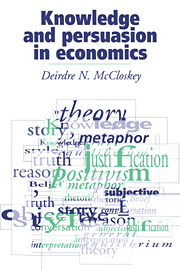2 - Kicking the dead horse
Published online by Cambridge University Press: 01 February 2010
Summary
The graduate student became a “Chicago” economist at Harvard, influenced by John Meyer's approach to transportation economics and Peter Temin's pellucid course in economic history up the street at Massachusetts Institute of Technology. In the violent summer of 1968 he began twelve years' teaching at the University of Chicago.
Gradually his student positivism faded. Before Chicago he had spent a year in England working, as I have said, with English economic historians trained more traditionally. At Chicago he attended seminars with historians from the history department and could not shake off the impression that these people, though not following the positivism of economics, were intelligent. He served on committees and played poker with people from other departments in the Division of the Social Sciences. Even anthropologists, sociologists, geographers, and political scientists, it turned out, were not misled dolts. The experience of different ways of knowing made the formulas of positivism seem less convincing.
Such intellectual growth will come as a surprise to people who cannot think of the Chicago School of Economics as anything but the incarnation of evil (such people are surprisingly common, and surprisingly ready to organize necktie parties to give expression to their thoughts; it often develops that they do not know what they are talking about, namely, the Good Old Chicago School of such people as Frank Knight, T. W. Schultz, Margaret Reid, and Ronald Coase).
- Type
- Chapter
- Information
- Knowledge and Persuasion in Economics , pp. 13 - 24Publisher: Cambridge University PressPrint publication year: 1994



